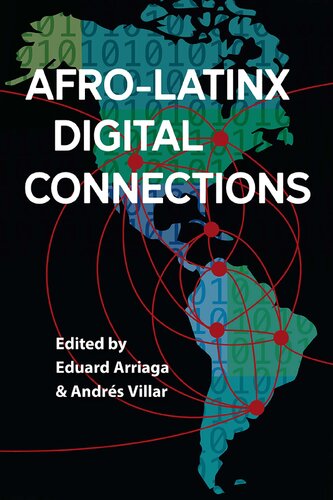

Most ebook files are in PDF format, so you can easily read them using various software such as Foxit Reader or directly on the Google Chrome browser.
Some ebook files are released by publishers in other formats such as .awz, .mobi, .epub, .fb2, etc. You may need to install specific software to read these formats on mobile/PC, such as Calibre.
Please read the tutorial at this link: https://ebookbell.com/faq
We offer FREE conversion to the popular formats you request; however, this may take some time. Therefore, right after payment, please email us, and we will try to provide the service as quickly as possible.
For some exceptional file formats or broken links (if any), please refrain from opening any disputes. Instead, email us first, and we will try to assist within a maximum of 6 hours.
EbookBell Team

4.0
26 reviewsThis volume presents examples of how digital technologies are being used by people of African descent in South America and the Caribbean, a topic that has been overlooked within the field of digital humanities. These case studies show that in the last few decades, Black Latinx communities have been making themselves visible and asserting long-standing claims and rights through digital tools and platforms, which have been essential for enacting discussions and creating new connections between diverse groups.
Afro-Latinx Digital Connections includes both research articles and interviews with practitioners who are working to create opportunities for marginalized communities. Projects discussed in this volume range from an Afrodescendant digital archive in Argentina, blog networks in Cuba, an NGO dedicated to democratizing technology in Brazilian favelas, and the recruitment of digital media to fight racism in Peru. Contributors demonstrate that these tools need not be state of the art to be effective and that they are often most useful when employed to sustain a resilience that is deep and historically grounded.
Digital connections are shown here as a means to achieve social justice and to create complex self-representations that challenge racist images of Afrodescendant peoples and monolithic conceptions of humanity. This volume expands the scope of digital humanities and challenges views of the field as a predominantly white discipline.
Contributors: Sandra AbdAllah-Álvarez | Adebayo Adegbembo | Maya Anderson-González | Eduard Arriaga | Silvana Bahia | Yvonne Captain | Monica Carrillo | Yancy Castillo | Alí Majul | Maria Cecilia Martino | Andrés Villar
A volume in the series Reframing Media, Technology, and Culture in Latin/o America, edited by Héctor Fernández L’Hoeste and Juan Carlos Rodríguez